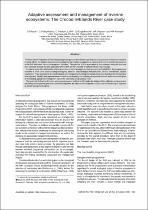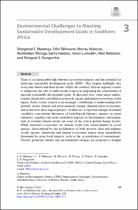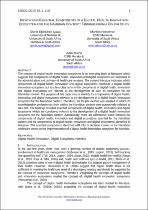 ResearchSpace
ResearchSpace
Adaptive assessment and management of riverine ecosystems: the Crocodile/Elands River case study
JavaScript is disabled for your browser. Some features of this site may not work without it.
- ResearchSpace
- →
- Research Publications/Outputs
- →
- Journal Articles
- →
- View Item
| dc.contributor.author |
Roux, DJ

|
en_US |
| dc.contributor.author |
Kleynhans, CJ

|
en_US |
| dc.contributor.author |
Thirion, C

|
en_US |
| dc.contributor.author |
Hill, Liesl

|
en_US |
| dc.contributor.author |
Engelbrecht, JS

|
en_US |
| dc.contributor.author |
Deacon, AR

|
en_US |
| dc.contributor.author |
Kemper, NP

|
en_US |
| dc.date.accessioned | 2007-03-26T13:52:59Z | en_US |
| dc.date.accessioned | 2007-06-07T10:09:13Z | |
| dc.date.available | 2007-03-26T13:52:59Z | en_US |
| dc.date.available | 2007-06-07T10:09:13Z | |
| dc.date.copyright | en_US | |
| dc.date.issued | 1999-10 | en_US |
| dc.identifier.citation | Roux, DJ, et al. 1999. Adaptive assessment and management of riverine ecosystems: the Crocodile/Elands River case study. Water SA, vol. 25(4), pp 501-511 | en_US |
| dc.identifier.issn | 0378-4738 | en_US |
| dc.identifier.uri | http://hdl.handle.net/10204/2075 | en_US |
| dc.identifier.uri | http://hdl.handle.net/10204/2075 | |
| dc.description.abstract | The River Health Programme (RHP) is being designed to generate information regarding the ecological state of riverine ecosystems in South Africa. An adaptive assessment and management procedure is suggested as a means of linking the monitoring outcomes of the RHP with water resource management decisions. The potential of such a procedure is demonstrated, using data that have been collected, through the pilot application of the RHP, on the Crocodile and Elands Rivers, Mpumalanga. In order to assess the collected data relative to a reference state, homogeneous river segments were identified. Each segment was classified in terms of its relative ecological integrity, based on three biological indicators (fish, benthic invertebrates, riparian vegetation). These assessments of current integrity were compared with management goals and quality objectives for the respective river segments. Finally, river segments were ranked in terms of priority for receiving management attention, and an example is given of formulating appropriate management actions for addressing a high priority need. The systematic following of the step-wise procedure would facilitate and formalise the linking of data collection and assessment, the setting of management goals and quantifiable objectives, the selection of management options, and the monitoring of responses to chosen management actions. | en_US |
| dc.format.extent | 126155 bytes | en_US |
| dc.format.mimetype | application/pdf | en_US |
| dc.language.iso | en | en_US |
| dc.publisher | Water Research Commission | en_US |
| dc.rights | Copyright: 1999 Water Research Commission | en_US |
| dc.source | en_US | |
| dc.subject | Riverine ecosystems | en_US |
| dc.subject | River health programme | en_US |
| dc.subject | Water resource management | en_US |
| dc.subject | Aquatic ecosystems procedure | en_US |
| dc.subject | Ecosystem assessment | en_US |
| dc.subject | Managing ecosystem | en_US |
| dc.subject | Mpumalanga rivers | en_US |
| dc.subject | South Africa | en_US |
| dc.subject | Water resources | en_US |
| dc.title | Adaptive assessment and management of riverine ecosystems: the Crocodile/Elands River case study | en_US |
| dc.type | Article | en_US |
| dc.identifier.apacitation | Roux, D., Kleynhans, C., Thirion, C., Hill, L., Engelbrecht, J., Deacon, A., & Kemper, N. (1999). Adaptive assessment and management of riverine ecosystems: the Crocodile/Elands River case study. http://hdl.handle.net/10204/2075 | en_ZA |
| dc.identifier.chicagocitation | Roux, DJ, CJ Kleynhans, C Thirion, Liesl Hill, JS Engelbrecht, AR Deacon, and NP Kemper "Adaptive assessment and management of riverine ecosystems: the Crocodile/Elands River case study." (1999) http://hdl.handle.net/10204/2075 | en_ZA |
| dc.identifier.vancouvercitation | Roux D, Kleynhans C, Thirion C, Hill L, Engelbrecht J, Deacon A, et al. Adaptive assessment and management of riverine ecosystems: the Crocodile/Elands River case study. 1999; http://hdl.handle.net/10204/2075. | en_ZA |
| dc.identifier.ris | TY - Article AU - Roux, DJ AU - Kleynhans, CJ AU - Thirion, C AU - Hill, Liesl AU - Engelbrecht, JS AU - Deacon, AR AU - Kemper, NP AB - The River Health Programme (RHP) is being designed to generate information regarding the ecological state of riverine ecosystems in South Africa. An adaptive assessment and management procedure is suggested as a means of linking the monitoring outcomes of the RHP with water resource management decisions. The potential of such a procedure is demonstrated, using data that have been collected, through the pilot application of the RHP, on the Crocodile and Elands Rivers, Mpumalanga. In order to assess the collected data relative to a reference state, homogeneous river segments were identified. Each segment was classified in terms of its relative ecological integrity, based on three biological indicators (fish, benthic invertebrates, riparian vegetation). These assessments of current integrity were compared with management goals and quality objectives for the respective river segments. Finally, river segments were ranked in terms of priority for receiving management attention, and an example is given of formulating appropriate management actions for addressing a high priority need. The systematic following of the step-wise procedure would facilitate and formalise the linking of data collection and assessment, the setting of management goals and quantifiable objectives, the selection of management options, and the monitoring of responses to chosen management actions. DA - 1999-10 DB - ResearchSpace DP - CSIR KW - Riverine ecosystems KW - River health programme KW - Water resource management KW - Aquatic ecosystems procedure KW - Ecosystem assessment KW - Managing ecosystem KW - Mpumalanga rivers KW - South Africa KW - Water resources LK - https://researchspace.csir.co.za PY - 1999 SM - 0378-4738 T1 - Adaptive assessment and management of riverine ecosystems: the Crocodile/Elands River case study TI - Adaptive assessment and management of riverine ecosystems: the Crocodile/Elands River case study UR - http://hdl.handle.net/10204/2075 ER - | en_ZA |








